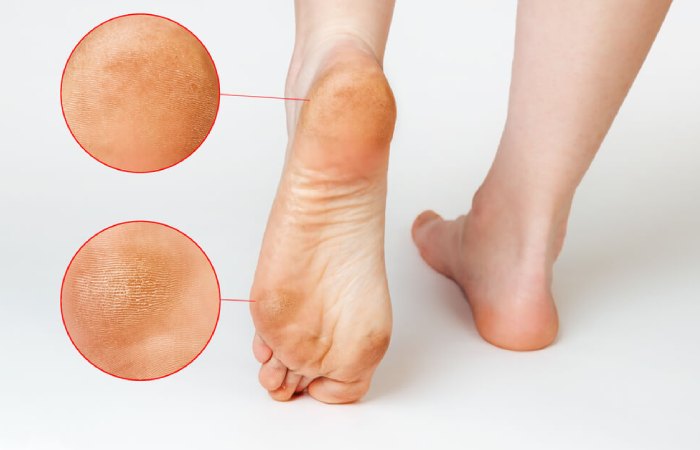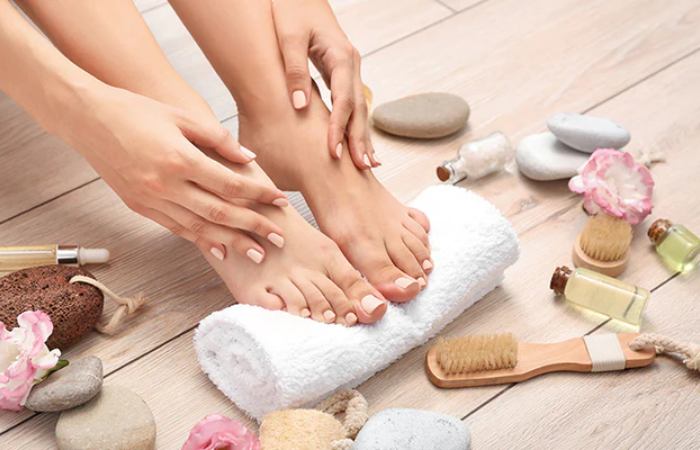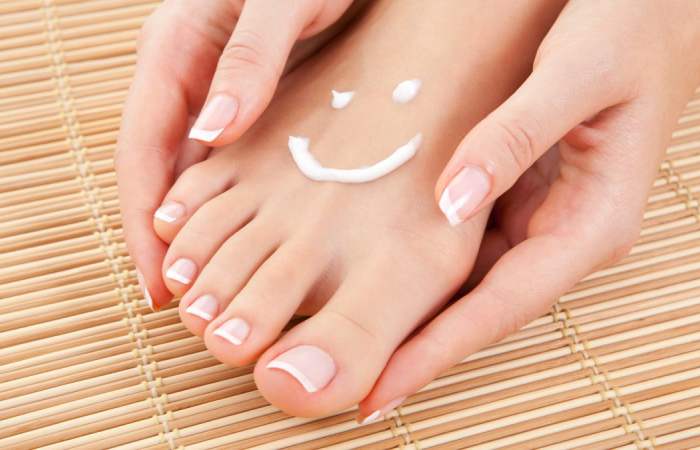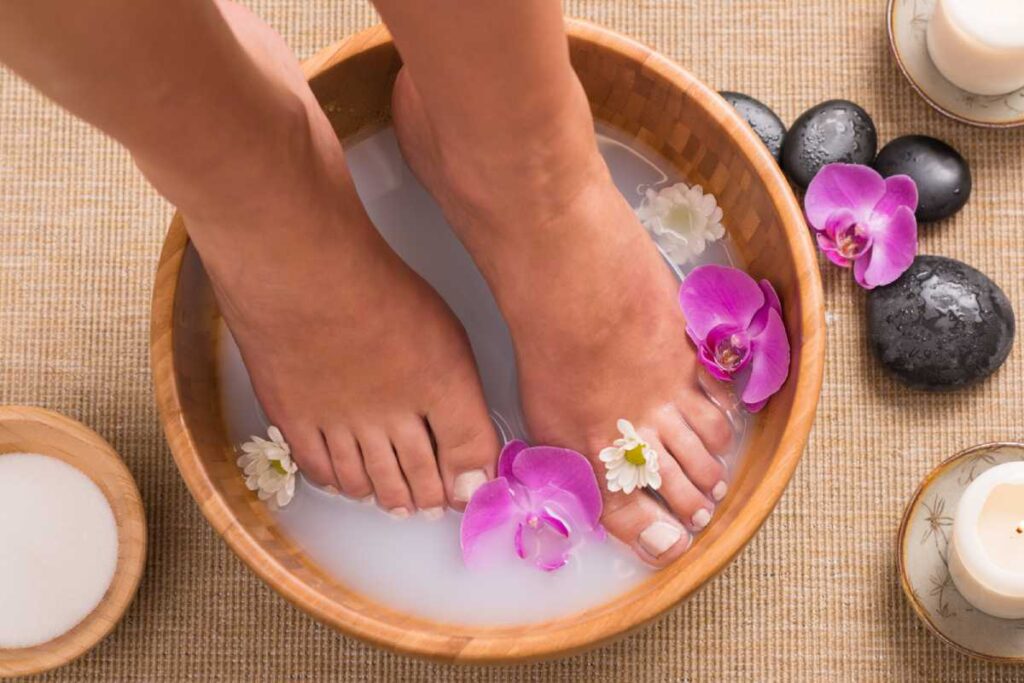Foot care is a vital yet often neglected aspect of skin care. From calluses to cracked heels, many clients experience foot issues that cause discomfort, pain, and embarrassment. As an esthetician, you can offer specialized treatments that tackle these problems and boost your client’s confidence. This guide provides an in-depth look at vital techniques and skin care treatments for optimal foot care, focusing on exfoliation, moisturizing, and massage.
Understanding Common Foot Skin Concerns

Foot problems are more common than many people realize and can significantly affect a client’s quality of life. Here are some of the most prevalent issues:
Calluses
They are condensed patches of skin that form due to continuous friction and pressure, typically from wearing ill-fitting shoes or standing for protracted periods. Calluses can be painful and make walking uncomfortable, potentially leading to more serious problems if not properly managed.
Dry, Flaky Skin
Feet are particularly prone to dryness, which can result in rough, flaky patches. Without proper care, this dryness can escalate to cracking and bleeding skin, increasing the risk of infection and causing significant pain during daily activities.
Cracked Heels
Severe dryness can lead to deep fissures in the heels. These cracks are not only painful but can also become infected if not properly treated, significantly impacting mobility and overall comfort.
What Services Can You Offer? Essential Foot Care Techniques

As a spa professional, providing foot care to your clients involves addressing these common issues with targeted treatments:
Exfoliation
Regular exfoliation helps eradicate dead skin cells and smooth rough areas, preventing the buildup of calluses. Using a gentle scrub or foot file during treatment can make a significant difference.
Moisturizing
Keeping skin hydrated is essential to preventing dryness and cracking. After exfoliation, applying rich foot creams containing urea or lactic acid delivers deep hydration and helps maintain healthy skin.
Addressing Specific Issues
For calluses and cracked heels, use specialized treatments to alleviate discomfort and prevent further complications. Regular use of a pumice stone and applying thick, reparative creams can make a significant difference.
A Guide For Foot Treatments

Whether your clients are dealing with cracked heels or callused feet or need a rejuvenating foot treatment, this guide will help you prepare and provide the best care possible for their feet.
1. Preparation
Before beginning the foot treatment, ensure all necessary products and tools are within reach. Prepare a comfortable area for the client to relax and soak their feet.
2. Foot Soak
Begin the treatment with a foot soak. Fill a sink with heartfelt water and add in a product that is suitable for the foot soak. Epsom salt is a good choice for most clients, but you can also choose a targeted product to address specific needs.
Have the client soak their feet for 10-15 minutes to soften the skin and make it easier for product absorption.
3. Exfoliating Foot Scrub
After soaking, gently dry the client’s feet with a towel. You may want to leave the feet slightly damp depending on the exfoliant you’ve selected.
Next, it’s time for exfoliation. Apply a physical scrub such as the Coconut Sugar Scrub to the feet and gently massage in circular motions, focusing on rough areas. This scrub is particularly effective for dry skin as it contains coconut oil, which offers the skin a hydrating feel, as well as natural sugar cane crystals, which include natural alpha hydroxy acid for exfoliation.
Finish the exfoliation by rinsing off your chosen scrub with warm water. Pat the feet dry.
4. Callus Removal
It’s time to buff the calluses to create smooth-looking skin. Make use of a foot file or callus remover to moderately buff away thickened skin on the heels and other rough areas.
Be gentle and avoid over-buffing to prevent irritation.
5. Paraffin Wax Treatment
After callus removal, you can move on to the paraffin wax treatment. Start by tender the paraffin wax in a paraffin bath until it reaches a liquid state.
Carefully dip the client’s feet into the warm wax, coating them evenly. Allow the wax to harden slightly before wrapping the feet in plastic wrap or a plastic bag. Cover with a heartfelt towel and let sit for 15-20 minutes. Remove the wax by peeling it off gently.
6. Moisturize The Feet
Our Eminence Organics Product Support Representatives, recommend applying the nourishing Apricot Body Oil to the feet and massaging it to hydrate and improve the appearance of dry skin. This oil is chock full of vitamins A, B, and C to soften the skin, while the Biocomplex2™ an antioxidant booster that transforms skin so that it’s strengthened and resilient.
7. Apply A Body Wrap
Next, you want to body wrap the feet in a treatment. This process will allow for the retention of heat and moisture, meaning that ingredients penetrate more deeply into the skin, leaving the skin softer, more hydrated-looking, and better exfoliated.
First, apply a mango enzyme body wrap to the feet, ensuring full coverage, and then wrap them in a hot, dry towel. Leave the wrap on for 10-15 minutes, allowing the enzymes to work on the skin. After 10-15 minutes, remove the wrap and mildly rinse the feet with warm water.
8. Finish With Lotion
Apply a lotion such as the Mangosteen Body Lotion to the feet, massaging thoroughly to lock in moisture and leave the skin sensitivity soft and smooth. The Mangosteen Body Lotion is formulated with a unique lactic acid complex designed to resurface to reveal bright, radiant-looking skin gently.


